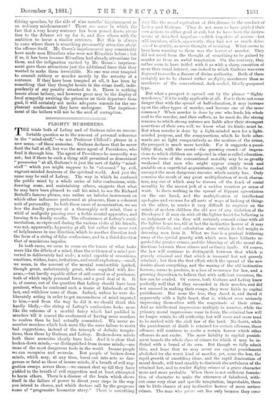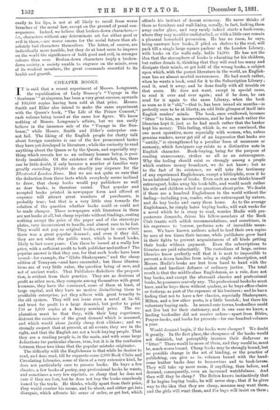FLIGHTY MURDERERS.
THE trials both of Lefroy and of Guiteau raise an uncom- fortable question as to the amount of personal coherence in the "mind-staff,'—to use Professor Clifford's phrase in a new sense,—of these assassins. Guiteau declares that he never fired the ball at all, but was the mere agent of Providence, who fired it through him. The agent of Providence he assuredly was not; but if there be such a thing still permitted as demoniacal " possession " at all, Guiteau's is just the sort of flabby " mind- stuff " which you might suppose to be "obsessed" by evil, vagrant-minded denizens of the spiritual world. And just the same may be said of Lefroy. The way in which he confused the public mind by a whole series of false confessions, with- drawing some, and maintaining others, suggests that what he may have been pleased to call his mind, to use Sir Richard Bethell's famous phrase, was rather an inferior instrument on which other influences performed at pleasure, than a coherent unit of personality. In both these cases of assassination, we see less the deadly purpose of a thoroughly evil mind, than a whiff of malignity passing over a feeble mental apparatus, and turning it to deadly results. The effusiveness of Lefroy's senti- mentalism, as expressed during the various visits of his friends, was not, apparently, hypocrisy at all, but rather the same sort of helplessness in one direction, which in another direction took the form of a string of false confessions, and in a third direction that of murderous impulse.
In both cases, we seem to come on the traces of what looks more like the debris of a mind, than the evidence of a mind per- verted to deliberately bad ends ; a mind capable of sensations, emotions, wishes, fears, irritations, and small explosions,—small, we mean, in the amount of the mental combustible ignited, though great, unfortunately great, when supplied with fire- arms,—but hardly capable either of self-control or of penitence, both of which imply personal force, and a good deal of it. It is, of course, out of the question that Lefroy should have been penitent, when he confessed such a tissue of falsehoods at the last, and withdrew some of them. Indeed, unless he were de- liberately acting in order to get unsoundness of mind imputed to him,—and from the way he did it we should think this hardly likely,—the string of Lefroy's confessions looks more like the outcome of a morbid fancy which had paddled in murders till it craved the excitement of having more murders to confess than he had actually committed. We never re- member murders which look more like the mere failure to resist bad suggestions, instead of the triumph of definite tempta- tions, than those by Guiteau and Lefroy. Broken-down minds both these assassins clearly have had. And it is clear that broken-down minds,—as distinguished from insane minds,—are some of the most dangerous tools in the world. Insane people we can recognise and restrain. But people of broken-down minds, which may, at any time, burst out into acts as dan- gerous or fatal as those of insane minds, if a breath of evil sug- gestion sweeps across them,—we cannot shut up till they have yielded to the breath of evil suggestion and at least attempted to harm others. There is a disease of the brain which shows itself in the failure of power to direct your steps in the way you intend to choose, and which doctors call by the gorgeous name of "progressive locomotor ataxy." There is something very like the moral equivalent of this disease in the conduct of Lefroy and Guiteau. They do not seem to have guided their own actions to either good or evil, but to have been the instru- ments of detached impulses—selfish impulses of course—bat still impulses, which, apparently, they had not so much deter- mined to gratify, as never thought of resisting. What seems to bare been wanting to them was the horror of murder. They did not recoil from the thought of something to be gained by murder as from an awful temptation. On the contrary, they rather seem to have trifled with it as with a sharp sensation of more than usual interest, one indeed to which Guiteau was even disposed to ascribe a flavour of divine authority. Both of them certainly are to be classed rather as flighty murderers than as murderers of the conventional, dark-souled, bloody-purposed
type.
But what a prospect is opened out by the phrase "flighty murderers," if it be really applicable at all. For is there not some danger that with the spread of half-education, it may increase upon the other types of murder, and become one of the more common ? When murder is done by one who lends his whole soul to the murder, and then suffers, as he must do, the strong remorse to which strong natures are liable after their strongest assertions of their own will, we know what its limits must be. But when murder is done by a light-minded man for a light- minded purpose, and the compunctions which he feels after- wards are as light comparatively as the motives of the crime, the prospect is much more terrible. For it suggests a possi- bility that, with the crowd—the growing crowd—of impres- sions to which children are subjected in what is called education, even the roots of the conventional morality may be so greatly weakened that men who might appear simply weak and amiable on a superficial acquaintance, ought still to be ranked amongst the most dangerous enemies which society has. Only conceive the result of any great multiplication of weak charac- ters, any one of which may be thrown off the track of social morality by the merest jerk of a sudden vexation pr sense of want. Is there nothing in the spread of flippant agnosticism on the one hand, and the multiplication of intellectual apologies and excuses for all sorts of ways of looking at things
on the other, to render it very difficult to engrave on the minds of modern children the old awe of any violation of the Decalogne ? If men sin with all the lighter heart for believing in no judgment of sin, they will certainly commit crime with all the lighter heart too, till at last the instinctive horror of it may
greatly dwindle, and calculation alone retain its full weight in deterring men from it. What we fear is a gradual frittering away of the special gravity with which men have hitherto re- garded the greater crimes, and the blurring of all the moral dis- tinctions between these crimes and ordinary faults. Of course, the law will continue to distinguish between that which is gravely criminal and that which is immoral but not gravely criminal ; but then the first effect which the spread of the new doubts about everything, and the waning of the old instinctive horrors, seems to produce, is a loss of reverence for law, and a growing disposition to believe that with sufficient resources, the law can be evaded. Of course, both Guitean and Lefroy knew perfectly well that if they succeeded in their murder, and did not succeed in making their escape, they were liable to capital punishment. But none the less, they dared it, and dared it apparently with a light heart, that is, without even seriously impressing themselves with the magnitude of their crime. And as intellectual impressions multiply in number, while the primary moral impressions wane in force, the criminal law will no longer retain its old authority, but will more and more tend to be ranked with the civil Law of the land. No doubt, while the punishment of death is retained for certain offences, these offences will continue to excite a certain horror which other offences do not excite. The mere liability to capital punish- ment brands the whole class of crimes for which it may be in- flicted with a brand of its own. But though we fully admit this, and hope that we may never see capital punishment abolished for the worst kind of murder, yet, none the less, the rapid growth of unsettling ideas, and the rapid diminution of moral dreads, will tend steadily to diminish the awfulness of the criminal law, and to render flighty crimes of a grave character more and more probable. When there is not sufficient founda- tion of character to make the utterance of falsehood, with- out some very clear and specific temptation, improbable, there can be little chance of any instinctive horror of more serious crimes. The man who poirs out lies only because they come easily to his lips, is not at all likely to recoil from worse breaches of the moral law, except on the ground of penal con- sequences. Indeed, we believe that broken-down characters,- i.e., characters without any determinate set for either good or evil in them,—are worse omens for the social future than ab- solutely bad characters themselves. The latter, of course, are individually more terrible, but they do at least seem to impress on the world the significance of both good and evil, in stronger colours than ever. Broken-down characters imply a broken- down society, a society unable to engrave on the minds, even of its weakest members, the great commands essential to its health aud growth.







































 Previous page
Previous page